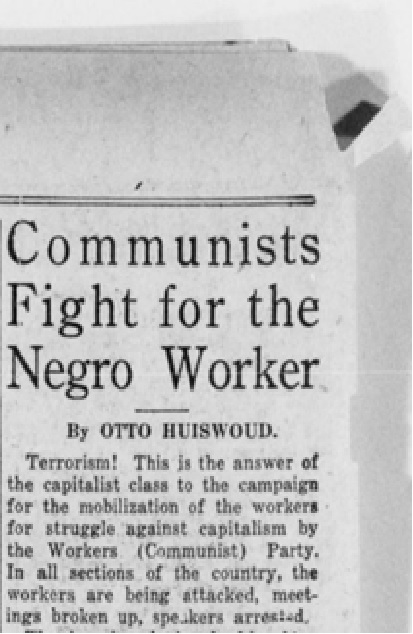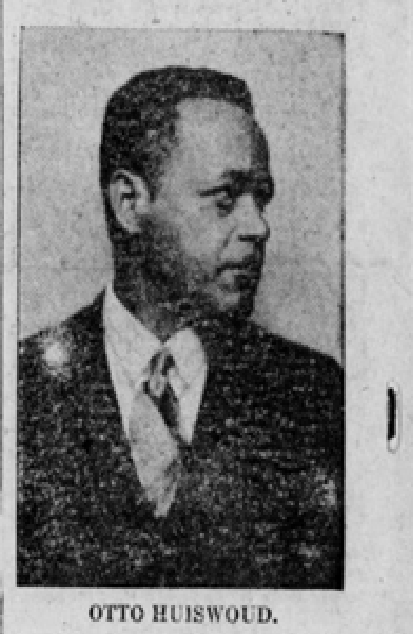Transatlantic Racial Protest
Otto Huiswoud: The Multiple Dimensions of Black (Dutch) Activism in the Early 20th Century

1920s - 1950s:
Anti-colonial movement
Black activism can take many different forms and Otto Huiswoud embodies the changing nature of Black activism in the early twentieth century. In 1922, Otto Huiswoud was the only Black co-founder of the Communist Party, USA (CPUSA), and he was one of the first Black delegates to attend a Communist International (Comintern) congress that same year. Huiswoud became a prominent figure in the communist movement who helped address issues of racism and colonialism. In the early work of Otto it is evident that the activist connected the struggles against racism, economic inequality, and anti-colonialism because, like other Black activists, he believed all of these forms of inequality were obstacles to achieving equality for Black people.
The Daily Worker

Newspaper article written by Otto Huiswoud. Otto Huiswoud, “Communists Fight for the Negro Worker”, The Daily Worker (27 October 1928) Image ©: Library of Congress.
Otto specifically advocated for the focus on racial justice in the CPUSA because the combined racial and economic injustice greatly impacted Black people. In his article “Communists Fight for the Negro Worker” (see image) for The Daily Worker, the newspaper of the CPUSA, Otto wrote about the important work the CPUSA had done for the struggle against racism: “Everywhere Negro workers are drawn into the ranks of the only Party that fights against segregation, [disenfranchisement], lynching and for the organization of the Negro and white workers on a basis of equality.”
Otto started working more closely with the Comintern and the focus shifted to anti-colonialism and the connection between economic and racial inequality as well as colonial oppression. Hermina Dumont Huiswoud, a political activist, worked with Otto, her husband, for the International Trade Union Committee for Negro Workers (ITUNCW), an organization created by the Comintern, and its publication The Negro Worker. Otto and Hermina connected Black people through communism, not only in the US, but in countries in Latin America and on the African continent. The struggles for racial equality and anti-colonialism both focused on the liberation of Black people, and the communist movement had provided an international network through which Black people could unite in their struggles against racism and colonialism.
Communism and anticolonianism
Otto started working more closely with the Comintern and the focus shifted to anti-colonialism and the connection between economic and racial inequality as well as colonial oppression. Hermina Dumont Huiswoud, a political activist, worked with Otto, her husband, for the International Trade Union Committee for Negro Workers (ITUNCW), an organization created by the Comintern, and its publication The Negro Worker. Otto and Hermina connected Black people through communism, not only in the US, but in countries in Latin America and on the African continent. The struggles for racial equality and anti-colonialism both focused on the liberation of Black people, and the communist movement had provided an international network through which Black people could unite in their struggles against racism and colonialism.
Picture of Otto Huiswoud accompanying the article in The Daily Worker. Images © Library of Congress.

"Our Suriname"
Eventually Otto was arrested in Suriname for his affiliation to the communist movement and after being released and relocating to the Netherlands after World War Two, Otto and Hermina became influential in the Dutch-Surinamese anti-colonial movement. The Huiswouds joined Vereniging Ons Suriname (VOS, Association Our Suriname) which was a community organization that connected Surinamese-Dutch people. Under Otto’s leadership, as chair of the organization, VOS became a more political and anti-colonial organization. Otto also helped set up the organization’s publication De Koerier (The Messenger) and continued to focus on increasing the awareness of Black people on issues of colonialism and racism and the (global) connections between different forms of inequality. Although the goals may have differed, the importance of raising awareness to connect people who experienced similar forms of injustice was present in the international communist movement, the Surinamese-Dutch anti-colonial movement as well as in the American movement for racial equality. Otto and Hermina demonstrated that Black activism in its most effective form challenges multiple forms of inequality to strive for radical equality for all.